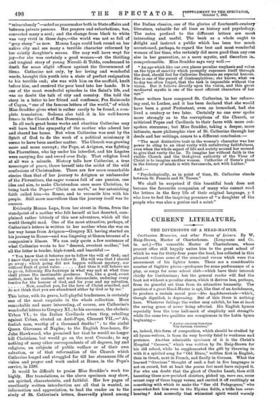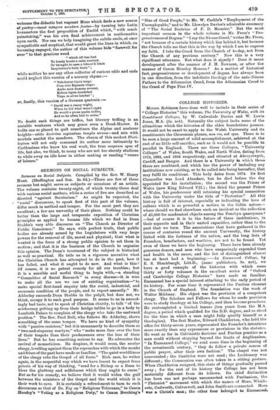highly. Her translations, as the above specimen may show, The
notes prefixed to the different letters are most interesting and useful. The book as a whole ought to
C URRENT LITE RAT (IRE.
THE DIVERSIONS OF A HEAD-MASTER.
Carthusian Memories, and other Verses of Leisure. By W. Haig-Brown, Master of Charterhouse. (Longnians and Co. 58. net.)—The venerable Master of Charterhouse, whose present office still happily unites him to the great school of which he was for thirty-four years the head, has collected in this pleasant volume some of the occasional verses which were the amusement of his lighter hours. There are a considerable number of fugitive pieces—prologues for some performance of a play, or songs for some school club—which have their interest chiefly for Carthusians ; but the general reader will find the book not without a peculiar charm, which it derives less, perhaps, from its graceful art than from its attractive humanity. The position of a great Head-Master is apt, like that of an Archdeacon, to produce a certain moral pose—i0os lipxiSiacuricahudv—which, though dignified, is depressing. But of this there is nothing here. Whatever failings the writer may exhibit, he has at least the saving grace of never being affected. His English hymns especially bear the true hall-mark of simplicity and strength* while the same two qualities are conspicuous in the Latin hymn beginning-
" Auctor omnium bonorttm Vita fortium virornm,"
as, indeed, this form of composition, which should be studied by all hymn-writers, is from its very brevity fatal to weakness and pretence. Another admirable specimen of it is the Christ's Hospital "Carmen," which was written by Dr. Haig-Brown for his old school, while he supplemented the gift by throwing in with it a spirited song for "Old Blues," written first in English, then in Greek, next in French, and finally in German. What the learned "Grecians" thought of such a feat in five languages is not on record, but at least the genius loci must have enjoyed it. For who can doubt that the ghost of Charles Lamb, then still haunting those now-perished cloisters, picked up, more suo, some errant copy of these happy verses, and carried it off exultingly as something with which to make the "fine old Pedagogues," who somewhat fret him even in the Elysian fields, a trifle less over- bearing P And assuredly that whimsical spirit would warmly
delight and instruct a public which has been too much accustomed, perhaps, to regard the best and most wonderful woman of her time, who certainly did more good than any one else in her generation, as a mere mystic, and therefore in..
comprehensible. Miss Scudder says very well :— " An age which like our own places peculiar emphasis and value on the type of sanctity which promptly expresses itself through the deed, should feel for Catherine Benincasa an especial honour. She is one of the purest of Contemplatives ; she knows, what we to-day too often forget, that the task is impossible without the vision. But it follows directly upon the vision, and this great
mediaeval mystic is one of the most efficient characters of her age:,
Some writers have compared St. Catherine, in her reform- ing zeal, to Luther, and it has been declared that she would have been a great Protestant, even an iconoclast, had she lived a century or two later. Certainly no one ever spoke more strongly as to the corruptions of the Church, or criticised Popes and Cardinals to their faces with more out- spoken sternness; but Miss Scudder, taking a deeper, more intimate, more philosophic view of St. Catherine through her deeds and her writings, comes to a different conclusion:— " The most distinctive trait in the woman's character was her power to cling to an ideal verity with unfaltering faithfulness, even when the whole aspect of life and society around her seemed to give that verity the lie. To imagine her without faith in the visible Church and the God-given authority of the Vicar of Christ is to imagine another woman. Catherine of Siena's place in the history of minds is with Savonarola, not with Luther."
" Psychologically, as in point of time, St. Catherine stands between St. Francis and St. Teresa."
We shall be surprised if this beautiful book does not become the favourite companion of many who cannot read the letters in the fiery life of their original language, y t who love to feel the inspiring presence of "a daughter of the people who was also a genius and a saint."
weloome the didactic but vagrant Muse which finds a new source of poetry—inset integros accedere fontes—by turning into Latin hexameters the first proposition of Euclid which, "with much painstaking," was his own final achievement in mathematics upon earth. Nor can we help imagining the subtle smile, at once sympathetic and sceptical, that would greet the lines in which, on becoming engaged, the author of this volume bide "farewell for ever" to that gracious weed
" which oft has lent To lonely hours a calm content, Or brought to ease a labour'd brain Inspiration's fairy train";
while neither he nor any other collector of curious odds and ends could neglect this version of a nursery rhyme :—
" Vehebatur tigris tergo Cum risu Bigensis virgo :
Ambo mor domum reversi, Bidens tigris incedebat Virgo in alveo latebat ";
or, finally, this version of a German quatrain :— " David was a canny wight, When he did what wasn't right He would a pious psalm indite, And so he often had to write."
No doubt such things are trifles, but literary trifling is an amiable weakness which may grace even a Head-Master. It befits one so placed to quit sometimes the Alpine and austerer heights—edite doctrine sapientum temple serene—and mix with mortals amidst the meadows. The charm of this modest /Uri- legium will not only commend its author more intimately to Carthusians who know his real work, the true magnum opus of life, but also, we think, to many who are not too sternly studious to while away an idle hour in either making or reading "verses of leisure."
SERMONS ON SOCIAL SUBJECTS.
Sermons on Social Subjects. Compiled by the Rev. W. Henry Hunt. (Skeffington and Son. 2s. 6d.)—There are few of these sermons but might serve as subjects or occasions of an article. The volume contains twenty-eight, of which twenty-three deal with various social matters, while a series of five are described as directed "against Secularism." As might be expected, the si "social" discourses, to speak first of this part of the volume, differ much in method and temper. For the most part they are excellent; a few are unworthy of their place. Nothing could be better than the large and temperate exposition of Christian principles as applied to human life which we find in Dean Stubbs's very able discourse on "The Church as Director of Public Conscience." He says, with perfect truth, that public bodies are already armed by the Legislature with very large powers for the removal of ills, moral and physical; that what is wanted is the force of a strong public opinion to set them in motion; and that it is the business of the Church to organise this opinion. The Dean's treatment of the subject is historical as well as practical. He tells us in a vigorous narrative what the Christian Church has attempted to do in the past, how it has failed, and what it ought to do now. And what is this? Of course, it is no patent remedy for all our troubles; but it is a sensible and useful thing to begin with,—s. standing "Committee of Social Research" in every diocese—it is wise to make all the use we can of existing organisation—" to make special first-hand enquiry into the social, industrial, and economic condition of the people, and to report annually." Mr. Adderley succeeds Dean Stubbs in the pulpit, but does not, we think, occupy it to such good purpose. It seems to us in exceed- ingly bad taste, not to speak of Christian charity, to talk "of the aristocracy getting up from their bridge tables to go in a body to Lambeth Palace to complain of the clergy who take the eastward position." The Rev. Paul Bull, who follows Mr. Adderley, shows something of the same temper. We have no kind of sympathy with "passive resisters," but it is unmannerly to describe them as "two-and-sixpenny martyrs," who "make more fuss over the loss of their teapots than their predecessors over the loss of their lives." But he has something serious to say. He advocates the revival of monasticism. He despises, it would seem, the secular clergy, levelling against them the reproaches with which the monks and friars of the past have made us familiar. "The quiet worldliness of the clergy robs the Gospel of all force." Rich men, he writes again, in the respectful way which we have learnt to expect from priests of his way of thinking, "send for a Bishop or a Dean to bless the gluttony and selfishness which they ought to curse." But as for his remedy, we believe that it would widen the gulf between the ministers of the Gospel and the world which it is their work to save. It is certainly a refreshment to turn to such discourses as that of Dr. Fry on "Religious Tolerance," to Canon Horsley's "Voting as a Religious Deity," to Canon Beeching's "Sins of Good People," to Mr. W. Carlile's "Employment of the Unemployable," and to Mr. Llewelyn Davies's admirable summary of "The Social Doctrine of F. D. Maurice." But the most important sermon in the whole volume is Mr. Frere's "Pro- gressiveness of Dogma." "I say the Nicene Creed," writes Mr. From, "not because of a certain history which lies behind it, but because the Church tells me that this is the way by which I am to express my faith. I take the Creed from the Church of to-day, not from the Church of any previous century." Now this is a very significant utterance. But what does it signify ? Does it mean development after the manner of J. H. Newman, or after the manner of Canon Hensley Henson ? As a matter of historical fact, progressiveness or development of dogma has always been in one direction, from the indefinite theology of the ante-Nicene Fathers to the Athanasian Creed, from the Athanaaian Creed to the Creed of Pope Pius IV.



























































 Previous page
Previous page